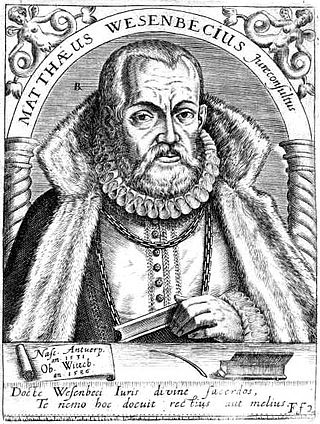
The Order of Preachers abbreviated OP, also known as the Dominicans, is a Catholic mendicant order of pontifical right founded in France, by a Spanish priest, saint and mystic, Dominic. It was approved by Pope Honorius III via the papal bull Religiosam vitam on 22 December 1216. Members of the order, who are referred to as Dominicans, generally carry the letters OP after their names, standing for Ordinis Praedicatorum, meaning of the Order of Preachers. Membership in the order includes friars, nuns, active sisters, and lay or secular Dominicans. More recently there has been a growing number of associates of the religious sisters who are unrelated to the tertiaries.

John Peckham was a Franciscan friar and Archbishop of Canterbury in the years 1279–1292.

The Summa contra Gentiles is one of the best-known treatises by Thomas Aquinas, written as four books between 1259 and 1265.
John Scory was an English Dominican friar who later became a bishop in the Church of England.

Antoninus of Florence, was an Italian Dominican friar, who ruled as an archbishop of Florence. He is venerated as a saint by the Catholic Church.

Raymond of Penyafort was a Catalan Dominican friar in the 13th century, who compiled the Decretals of Gregory IX, a collection of canonical laws that remained a major part of Church law until the 1917 Code of Canon Law abrogated it. He is honored as a saint in the Catholic Church and is the patron saint of canon lawyers.
Summa and its diminutive summula was a medieval didactics literary genre written in Latin, born during the 12th century, and popularized in 13th century Europe. In its simplest sense, they might be considered texts that 'sum up' knowledge in a field, such as the compendiums of theology, philosophy and canon law. Their function during the Middle Ages was largely as manuals or handbooks of necessary knowledge used by individuals who would not advance their studies any further.
John of Genoa or Johannes Balbus was an Italian grammarian and Dominican priest.
Nicolò Albertini, O.P., was an Italian Dominican friar, statesman, and cardinal.

As members of the Order of Preachers, Lay Dominicans are men and women, single or married, living a Christian life with a Dominican spirituality in the secular world. They find inspiration in the spiritual path taken by many saints, blesseds, and other holy men and women throughout the 800-year history of the Dominican Order. The Life of a Dominican layperson incorporates passion for the Word of God into the community of fellow Dominicans and the religious practices of the order. Lay Dominicans are members of worldwide provinces, bound to the governance structure of the Order of Preachers.
Bartolomeo Spina was an Italian Dominican theologian and scholastic philosopher.
Tancred of Bologna or of Germany, commonly just Tancredus, was a Dominican preacher and canonist. He is easily conflated with a contemporary Dominican, Tancred Tancredi, and the two are sometimes indistinguishable in the sources and have been treated as one person, though this is known to be false.

Matthew Wesenbeck was a Belgian jurist and a student of Gabriel Mudaeus. His Latin surname was also spelled Wesembecius or Vesembecius.
Thomas Lydiat was a clergyman and mathematician in England. In his time he was noted as a chronologer and was an opponent in controversy of Joseph Justus Scaliger. He is now considered, albeit in a very different type of theory, to have provided in 1605 a clear suggestion of an oval orbit in astronomy, anticipating Johannes Kepler, with whom he also had a controversial exchange relating to chronology.
John Matthew Rispoli was a major Maltese philosopher of great erudition. He was held in high esteem by the Grand Masters of the Knights Hospitaller Order, the Bishops of Malta, the Viceroys of Sicily, cardinals, bishops, inquisitors, and the common people. Perhaps the most eminent Maltese philosopher of the Middle Ages, the various extant writings of his are witness to his philosophical aptitude and dexterity as to his high calibre as a philosopher. These qualities were highly appreciated during his lifetime, in Malta as in France and Italy. He lived a busy life, both as an intellectual and as an administrator. He was professor of philosopher at various institutions of high education, an able preacher, and an official at various posts within the Dominican Order, of which his was a member. He was an avid aficionado of music, and was talented with playing musical instruments. Though the fame of holiness accompanied him in his life, this did not deter the Inquisition from suspecting him of heresy, and keeping him in its dungeons for fourteen months. When he died, he was given an almost state funeral.
John of Wales, also called John Waleys and Johannes Guallensis, was a Franciscan theologian who wrote several well-received Latin works, primarily preaching aids.
Robert of Cricklade was a medieval English writer and prior of St Frideswide's Priory in Oxford. He was a native of Cricklade and taught before becoming a cleric. He wrote several theological works as well as a lost biography of Thomas Becket, the murdered Archbishop of Canterbury.

The Dominican Priory of Sudbury or Sudbury Priory, was a medieval priory of the Dominican Order, also known as the Order of Friar Preachers or "Black Friars", in the town of Sudbury, Suffolk, England. The community was dispersed and the buildings demolished during the English Reformation in the 16th century. The materials were used to construct a large house on the same site, which survived into the 19th century.

William of Tripoli was a Dominican friar active as a missionary and papal nuncio in the Holy Land. He wrote two works about Islam, towards which he displayed an unusually irenic attitude for his time.
Richard Maidstone or Maydestone was an English Carmelite friar, theologian, and poet.









